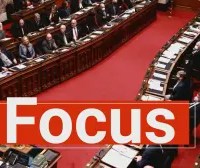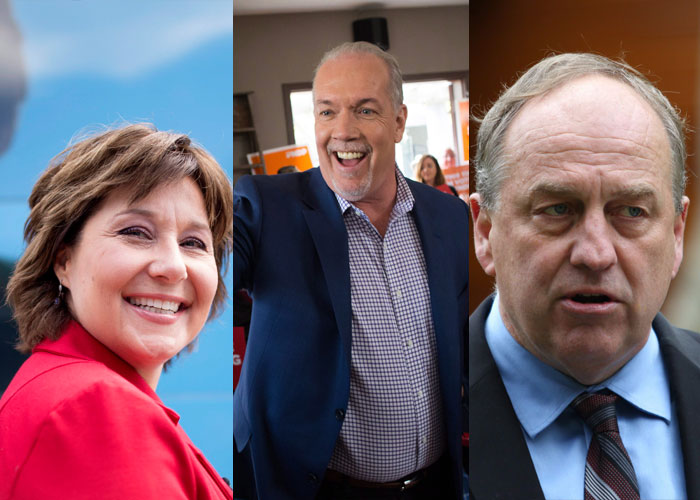British Columbia has long had a reputation for one of Canada’s wackiest political cultures.

2017 delivered in spades.
This year saw a watershed election with one of the closest finishes in Canadian history.
It saw the end of 16 years of BC Liberal rule, the rise of the NDP, and an unorthodox power sharing deal. It also saw the province’s lieutenant governor perform a once in a generation exercise of power.
It even saw B.C.’s system of political donations make headlines in the New York Times as the “Wild West of Canadian political cash.”
Here’s a look at some of the top stories from B.C.’s wild political year.
Nail-biter election… and (eventually) a new government
BC election results 2017: Global News projects Liberal government

The 2017 election forms the spring from which many of the year’s top political stories flowed. It was a tightly-fought, scrappy contest that ended in a slow-motion photo finish.
Christy Clark’s Liberals ran on a platform built around the party’s economic record and plans for job creation, while the NDP largely focused on affordability and urban issues, such as transit.
The campaign was largely gaffe-free, save for one encounter between Christy Clark and a voter in North Vancouver that many people perceived as dismissive, spawning a social media campaign with the hashtag #IamLinda.
Polls on the eve of the election predicted a dead heat — and they were right.
When the votes were counted on election night, just over 1,500 votes separated the two major parties. With 44 seats needed for a majority, the BC Liberals had 43, the NDP 41, and the Green Party three. In the closest riding of Courtenay-Comox, the NDP led by just nine votes.
After weeks of speculation and recounts, the results held, leaving B.C. with its first minority government in 65 years.
The BC Liberals, as the incumbent party, technically had first crack at forming government.
But could they retain power?
B.C. Greens and NDP strike deal for ‘stable’ minority government

With the election results certified, talk turned to negotiations with the Green Party, whose three seats would deliver power to either the NDP or the Liberals.
Both parties opened negotiations with the Greens. In the end, the NDP ‘s pitch won out and the parties signed a power-sharing “confidence and supply agreement.”
Under the agreement, the Greens would support the NDP on any budget or confidence vote, and the NDP pledged to hold a referendum on proportional representation and send the Site C dam for review by regulators.
Power hangs in the balance following Throne Speech at the B.C. Legislature

Even with an NDP-Green deal in place, the BC Liberals technically remained the government. While the province waited and watched, Premier Christy Clark swore in a cabinet and delivered a throne speech.

Get daily National news
Dubbed the “clone speech” by Province columnist Mike Smyth, the document represented a major reversal from the Liberals’ election platform, and borrowed heavily from the NDP’s.
The Liberals pledged to ban corporate and union donations, hold a referendum on electoral reform, increase welfare, and spend $1 billion on childcare spaces.
B.C. government to be led by NDP for the first time in 16 years

The fall of Christy Clark and the rise of NDP Leader John Horgan was the final, definitive story of the election.
More than seven weeks after British Columbians went to the polls, the question of who would lead the province was finally resolved, with help from B.C.’s lieutenant-governor.
The NDP and Greens defeated the BC Liberals on a confidence motion, sending Clark to Government House to speak with Lt.-Gov. Judith Guichon.
It later emerged that despite pledging not to send B.C. back to the polls, Clark asked Guichon to call another election rather than hand power to the NDP — whom she argued couldn’t maintain a stable government.
Guichon disagreed, calling Horgan to the residence and asking him to form a government, B.C.’s first change in power in 16 years.
The episode joined one of only a handful of incidents in Canadian history where the Queen’s representative used their constitutional powers to award political power.
A month later, Clark announced she would resign as BC Liberal leader and leave politics.
Site C
BC NDP to proceed with Site C dam, total cost raised to $10.7B

The Site C dam project was the new NDP government’s first major political decision, and it was a divisive one.
In December, the NDP announced it would complete the controversial Site C dam, raising the cost estimate for the mega-project to $10.7 billion.
The NDP had followed through on a pledge to send the dam to the B.C. Utilities Commission (BCUC), which found the dam would not be finished on time or on budget, but that scrapping it lead to $4 billion in sunk costs.
In moving forward, the NDP argued that it did not want to build the dam, but failing to do so would saddle BC Hydro ratepayers with a 12 per cent rate hike and put social programs in jeopardy.
The decision was bitterly divisive, and the consequences for the NDP have yet to be fully seen. The move was applauded by the opposition Liberals, along with the business community.
But First Nations, along with environmentalists and many within the NDP itself, were outraged.
Big money ban

The year began with the New York Times labelling B.C. the “‘Wild West’ of Canadian political cash.”
That “embarrassing” article was one of many that looked at B.C.’s lax political fundraising laws.
A special prosecutor eventually got involved after reports emerged that both major parties had accepted indirect donations, some from lobbyists on behalf of corporations, in contravention of the Elections Act.
The rules are now changing, with the NDP government limiting individual contributions to $1,200 a year and banning corporate and union donations.
But the move wasn’t without controversy: the NDP’s own plan will put taxpayers on the hook for financing political parties, at least for the next four years.
The province has also moved to put new restrictions on municipal political donations in place for the 2018 civic elections.
Opioid crisis
B.C. has already seen more overdose deaths this year than in all of 2016

It was bad in 2016, and it got worse in 2017. More than 1,200 British Columbians died of suspected drug overdoses in the first 10 months of this year compared to 985 in all of 2016.
2017 has seen an increasing willingness on the part of government to experiment with solutions. Supervised injection sites and overdose prevention sites have spread across the province.
The province is now offering drug-checking services in all of those locations, and has also expanded the distribution of free naloxone kits.
Health officials are looking at a pilot project to distribute hydromorphone opioid tablets to registered addicts next spring.
The province also has its first-ever minister of mental health and addictions, and the NDP has pledged an additional $322 million to fight the crisis.
However, advocates continue to call for more beds and options for treatment on demand, along with the expansion of more radical programs such as prescribing clean heroin to addicts.
Ride-hailing
Decision on ride-hailing delayed, BC NDP hires expert to review options

Another year is in the books, and B.C. remains without ride-hailing services like Uber.
Both the NDP and the BC Liberals had pledged to have the service in place by the 2017 holiday season. But after taking power, the NDP walked that commitment back.
The province has instead launched a new study of the taxi industry, and says ride-hailing may not be in place before next fall.
The move has sparked backlash both from a public frustrated with the lack of transportation options, and both opposition parties in the legislature.
The Greens have tabled their own ride sharing legislation, which is currently being studied by a legislative committee.
ICBC
ICBC seeks 6.4% basic rate increase after losing $500M last year

The future of B.C.’s cash-strapped public ensurer was another big political headline in 2017.
The agency is struggling with structural deficits from the rising number and cost of claims, along with the increase in costs of materials.
The NDP has thrown out several high-dollar figures on losses, ranging from $500 million to closer to $1 billion, and has warned of 2018 losses in the hundreds of millions.
The party has also accused the former BC Liberal government of raiding ICBC’s optional insurance side to balance budgets to the tune of $1 billion over the last six years.
The government has applied for a 6.4 per cent basic rate increase next year to try and stem the losses, along with new programs targeting distracted drivers and attempts to use technology to cut costs.
The NDP has commissioned a review of the agency’s finances, and says it will be implementing major changes in 2018.
Critics have warned the agency is a “financial trainwreck,” and that British Columbians could face rate increases in the range of 30 per cent in coming years.
Green growth
B.C. election: Greens face stickhandling act, experts say

Will 2017 be remembered as the year the Green Party achieved political relevance in B.C., or is it a flash in the pan?
The BC Greens finally broke through in the provincial election to capture three seats and about 17 per cent of the popular vote.
It was enough to put Green Leader Andrew Weaver in the position of “kingmaker,” which he used to crown Horgan premier — though the parties have chafed over several issues since then, chief among them the Site C dam.
The Greens haven’t just grown at the provincial level. In Vancouver’s school board byelection, Greens captured the top three of nine seats. Green trustee Janet Fraser was later elected board chair.
And on the Park Board, 2017 began with Green commissioner Michael Wiebe elected the body’s first Green chair, and ended with another Green, Stuart Mackinnon winning the job for 2018.
Those successes have prompted several pundits to wonder whether Vancouver Green Councillor Adriane Carr will take a crack at the mayor’s seat in the 2018 civic election.













Comments